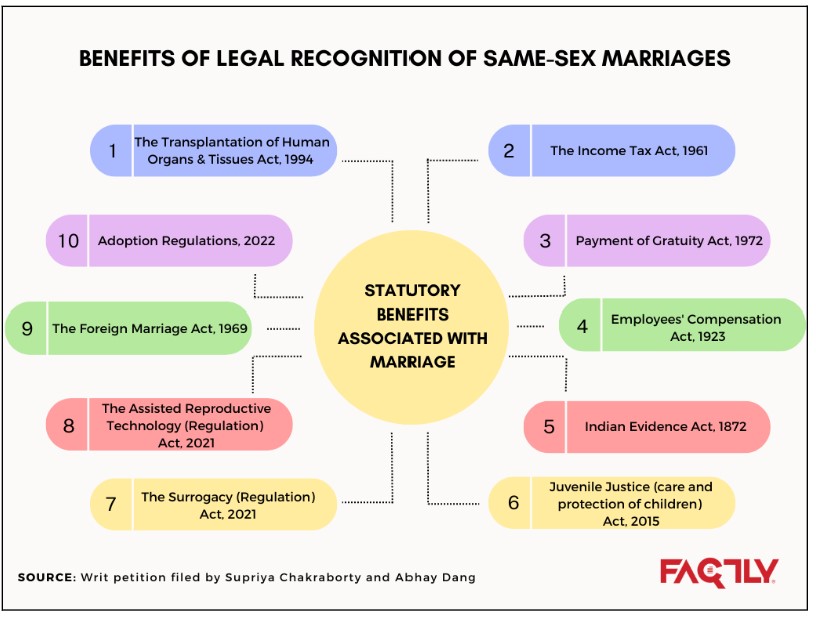The Supreme Court is hearing a batch of petitions praying for the legalization of same-sex marriages. But why are the petitioners pressing for legal recognition of same-sex marriages? What kind of financial & non-financial benefits are available to married couples from various statutes? Here is an explainer.
India’s Supreme Court is hearing a batch of petitions praying for the legalization of same-sex marriages. The petitioners challenged the constitutionality of the Special Marriage Act,1954 which recognizes marriages only between ‘male’ and ‘female’ persons. The petitioners pray that the non-recognition of same-sex marriage is a violation of the right to equality, freedom of expression and dignity.
As per the latest developments in the case, the Union Government agreed to set up a committee to consider extending legal rights to same-sex marriages without giving legal recognition to same-sex marriage. While the apex court called it a step in a positive direction, the petitioners are insistent on the legality of same-sex marriages.
But why is there so much insistence on legalizing same-sex marriage? What are the benefits associated with legal recognition of marriage? What challenges does it solve?
We break them down for you in this story.
Same-sex marriages- Matter of differing perspectives
Before delving into the benefits of legal recognition of same-sex marriages, let’s briefly understand the differing perspectives involved in this issue. A traditional approach opposes same-sex marriage on the basis that marriage has a fixed definition, and its meaning is deeply rooted in heterosexual procreation. It is a historical and religious institution that dates to the ancient times.
The advocates of same-sex marriage argue that marriage is a social construct and not a historical fact as claimed by the opponents. And as society evolves, the social construct can undergo changes to ensure the benefits are reaped by all its members irrespective of their personal characteristics.
The middle ground approach argues that same-sex persons are excluded by the definitional aspect of marriage and not based on their sexual orientation. They are ineligible because they do not fall under the prescribed definition of marriage. Specific laws can be codified for extending the legal benefits; however, the term ‘marriage’ must be reserved for heterosexual couples only. The Indian Government’s approach seems to be on similar lines, where it has agreed to set up a committee to consider extending legal benefits to same-sex couples.
What benefits were denied due to lack of legal recognition of same-sex marriages?
The absence of legal recognition of same-sex marriage denies certain statutory and non-statutory rights to same-sex couples. On the non-statutory aspect, the absence of legalization means a lack of societal acceptance and validation, and the ability to live together without any prejudices. It also denies them the right to celebrate their relationship in public without being labelled. Between the individuals, it denies them a sense of fulfilment.
On the statutory part, the below chart (not exhaustive) provides the rights denied to same-sex couples. Each statute will be explored in detail.

As seen above, the statutory benefits that are associated with legal recognition of marriage cover both financial and non-financial aspects of life.
Non-financial statutory benefits denied:
In addition to societal sanctity, married couples enjoy robust legal rights that emanate from the legal recognition of marriage. However, same-sex couples are deprived of such rights, recognition, and protection by law. These rights include choices of health decisions, adoption, procreation, and financial benefits such as joint ownership, succession, maintenance, and alimony among others.
A few key non-financial benefits that are denied to same-sex couples are as below.
Financial benefits that are available for married couples:
In matters of finance, marriage does alter situations. In addition to the emotional and social significance, marriage also has financial implications for the couple. Right from jointly owning property to filing taxes to compensatory benefits, the rules are different—and more favourable.
In addition to the statutory financial benefits, married couples also get certain concessions aimed at empowering women.
- Married couples seeking to purchase a property can opt for joint loans which makes the loan affordable, and they do come with lower interest rates if women are the primary applicants.
- Savings on stamp duty is a big benefit of choosing a joint home loan as husband and wife. For female buyers, the government provides a cheaper stamp duty rate. Many states have lowered rates for women compared to men to support women’s empowerment. States with lower stamp duty rates include Delhi, Uttar Pradesh, Haryana, Maharashtra among others.
- Opting for joint loans also enables greater tax deductions for couples under section 80(c) towards principal payments, and under section 24 of the Income Tax Act for interest paid.
- Additionally, in matters of succession, joint holding of property makes succession a smoother & seamless process, as the survivor becomes the rightful owner of the property.
- No tax shall be imposed if the aggregate amount of gifts received in a year is below Rs. 50,000. However, any gift (movable or immovable) made to relatives is non-taxable irrespective of the value of the transaction. Here, the relatives include parents, siblings, spouses and lineal ascendents.
Further, below is a snapshot of the financial benefits available to married couples in India.
Considering the above statutory and non-statutory benefits available to legally married couples, it is understandable that the petitioners are insisting on the legal recognition of same-sex marriages.
Featured Image: Legalization of same-sex marriages


